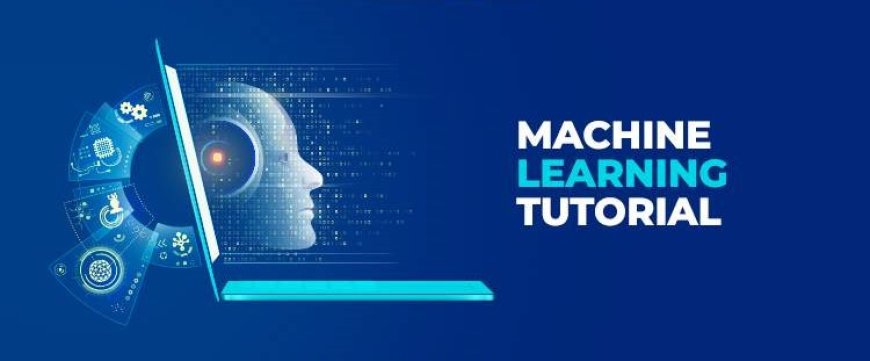Machine Learning with Python Tutorial
Master machine learning with Python! Our tutorial covers essential concepts, practical examples, and hands-on exercises for beginners. Learn today

Machine learning is a fascinating field that involves the development of algorithms and models that enable computers to learn from data and make predictions or decisions without explicit programming. Python has become a go-to language for machine learning due to its simplicity, versatility, and rich ecosystem of libraries like TensorFlow, sci-kit-learn, and PyTorch. Whether you're a seasoned developer or a beginner, Python's user-friendly syntax makes it accessible to anyone interested in exploring the exciting realm of machine learning. In this tutorial, we'll unravel the basics, and key concepts, and guide you through practical examples to kickstart your journey into the captivating world of machine learning using Python.
Python's Role in Empowering Machine Learning Enthusiasts
Machine learning, a branch of artificial intelligence, enables computers to learn and decide autonomously, eliminating the need for explicit programming. Python's user-friendly nature and adaptability have made it a favored language among machine-learning enthusiasts. A solid grasp of the fundamentals is essential for those aiming to leverage machine learning capabilities in their projects, emphasizing the importance of a foundational understanding in this dynamic and transformative field.
The Power of Python: A Suggested Language for Machine Learning
Machine learning, a branch of artificial intelligence, enables computers to learn and decide autonomously, bypassing traditional programming. Python's straightforwardness and adaptability have positioned it as the preferred language among machine learning enthusiasts. A grasp of fundamentals is essential for those aiming to leverage machine learning capabilities in their projects, forming the bedrock for effective problem-solving and data analysis.
What is Machine Learning?
Machine Learning is a field of artificial intelligence that focuses on developing systems capable of learning from data and making predictions or decisions without explicit programming. Instead of relying on explicit instructions, machine learning algorithms use statistical techniques to improve computers' performance on a specific task over time. It's like teaching a computer to recognize patterns and make informed choices based on examples and experiences. Whether it's recommending movies, identifying spam emails, or predicting stock prices, machine learning plays a crucial role in automating tasks and extracting valuable insights from vast amounts of information.
What is Python?
Python is a versatile, high-level programming language widely used for web development, data analysis, artificial intelligence, and more. Known for its simplicity and readability, Python has a vast community and an extensive library, making it a popular choice for various applications in the tech world.
Python’s Role in Machine Learning
Python plays a significant role in the field of machine learning. It has become the go-to language for many data scientists and machine learning practitioners due to its versatility and extensive libraries. Here are a few key points:
1. Libraries: Python boasts powerful libraries like NumPy, Pandas, and Scikit-learn, which provide essential tools for data manipulation, analysis, and machine learning algorithms.
2. Ease of Learning: Python's syntax is easy to understand, making it accessible for beginners. This is crucial in a field like machine learning, where understanding algorithms and implementing them is fundamental.
3. Community Support: The Python community is robust and active. This means a wealth of resources, tutorials, and forums are available for those working on machine-learning projects.
4. Integration with Other Technologies: Python seamlessly integrates with other technologies, making it easier to incorporate machine learning models into web applications, databases, and other systems.
5. Versatility: Python is a versatile language, capable of handling different aspects of the machine learning workflow, from data preprocessing to model deployment.
6. Popular Frameworks: Frameworks like TensorFlow and PyTorch, both extensively used for deep learning, have Python APIs. This has contributed to Python's dominance in the deep learning domain.
Python's simplicity, powerful libraries, and strong community support make it an excellent choice for machine learning tasks, enabling both beginners and seasoned professionals to develop and deploy effective models.
Applications of Machine Learning
Machine learning, a subfield of artificial intelligence (AI), has found applications across various industries, significantly impacting the way we analyze data, make decisions, and solve complex problems. Here are some key applications of machine learning:
1. Healthcare
-
Disease Prediction and Diagnosis: Machine learning models can analyze medical data to predict the likelihood of diseases and assist in early diagnosis.
-
Personalized Medicine: ML algorithms help tailor treatment plans based on individual patient data, optimizing outcomes and minimizing side effects.
-
Drug Discovery: ML accelerates the drug discovery process by predicting potential drug candidates and understanding their efficacy.
2. Finance
-
Fraud Detection: Machine learning algorithms identify patterns indicative of fraudulent activities, enhancing the security of financial transactions.
-
Algorithmic Trading: ML is employed to analyze market trends, make predictions, and execute trades at high speeds, optimizing investment strategies.
-
Credit Scoring: ML models assess creditworthiness by analyzing a person's credit history, behavior, and other relevant factors.
3. Marketing and Sales
-
Customer Segmentation: ML helps businesses categorize customers based on behavior, preferences, and demographics for targeted marketing strategies.
-
Recommendation Systems: Platforms like Netflix and Amazon use ML to suggest products and content based on user preferences and behavior.
-
Price Optimization: ML algorithms analyze market trends and competitor pricing to optimize product pricing strategies.
4. Transportation
-
Predictive Maintenance: ML models analyze sensor data to predict when maintenance is required for vehicles and machinery, reducing downtime.
-
Traffic Management: Machine learning is used to predict traffic patterns and optimize routes for efficient transportation.
-
Autonomous Vehicles: ML algorithms play a crucial role in enabling self-driving cars to navigate and make decisions based on real-time data.
5. Education
-
Personalized Learning: ML tailors educational content to individual student needs, providing a personalized learning experience.
-
Student Performance Prediction: Predictive analytics help identify students at risk of falling behind, allowing for timely intervention.
-
Automated Grading: ML algorithms can automate grading processes, saving time for educators.
6. Cybersecurity
-
Anomaly Detection: ML identifies unusual patterns in network traffic that may indicate a security threat.
-
Malware Detection: Machine learning models can learn to recognize patterns associated with malware, enhancing the detection and prevention of cyber attacks.
7. Manufacturing
-
Predictive Maintenance: ML helps anticipate equipment failures, reducing downtime and maintenance costs.
-
Quality Control: Machine learning is employed for image recognition to identify product defects during manufacturing.
8. Natural Language Processing (NLP)
-
Chatbots and Virtual Assistant ML-powered NLP enables the development of intelligent chatbots and virtual assistants that can understand and respond to human language.
-
Language Translation: Machine learning models can translate text from one language to another, facilitating global communication.
These applications represent just a fraction of the diverse and expanding use cases for machine learning. As technology continues to advance, we can expect even more innovative applications to emerge, further shaping the future across various industries.
This tutorial provides a comprehensive overview of machine learning with Python, emphasizing its accessibility and versatility. Python's simplicity, robust libraries, and active community make it an ideal choice for both beginners and experienced developers entering the dynamic field of machine learning. As showcased through diverse applications, from healthcare to finance and education, machine learning's transformative impact continues to shape industries worldwide. Armed with this foundational knowledge, you're well-equipped to embark on your journey into the captivating realm of machine learning using Python.











































